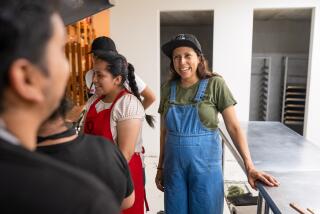On Grenada, Small Is Beautiful for Marketing Organic Products
HERMITAGE, Grenada — At his solar-powered factory in a cottage painted yellow and apricot, Mott Green peered dejectedly into his cocoa-grinding mixer, which had stopped working after he changed a battery.
“I think I’ve fried everything,” the chocolate entrepreneur said as he rifled through operating manuals for his home power system. “With two pieces of equipment down, I won’t be able to make chocolate for a few days.”
While the shutdown is an annoyance for the 37-year-old native New Yorker, it won’t dash his fortunes -- or deal much of a blow to the national economy. Like most other agricultural and food-processing operations in this Caribbean island nation, the Grenada Chocolate Co. is driven by the philosophy of thinking small.
With a weekly output of less than 300 pounds of dark chocolate, Green and his five partners can easily make up the lost production once the repairs are done.
“We want to stay small and exclusive,” said the barefoot businessman, who expects growing demand for his Internet-marketed chocolate bars made entirely with organic ingredients and what he calls “non-exploitative” practices.
With barely 100,000 people and territory one-eighth the size of Rhode Island, Grenada has embraced a niche development strategy that makes a virtue of necessity in this remote Caribbean archipelago.
Unable to fill major foreign orders because of a small labor force and limited arable land, Grenadians have lately laid claim to the small, scattered and demanding markets for organic foods and socially responsible agriculture.
At the 300-year-old Belmont Estate plantation in this lush village, Shadel Nyack Compton oversees the growing of dozens of fruits, vegetables, nuts and spices according to practices certified as “organic” by European soil inspection agencies.
“Our size limits our production, but if people know they can get quality, they will come to us,” said Compton, who also runs a terrace restaurant serving gourmet renditions of the estate’s pristine foods.
Just to the north, at the River Antoine plantation, Grenadian farmers are tending 150 acres of organic bananas, grown to order for the British supermarket chain Sainsbury’s, which offers a range of politically correct produce.
Nutmeg and rum, two traditional island products, contain no pesticides or chemical additives, said state horticulturist Daniel Lewis. Neither is yet being labeled as organic or offered for export, he said, because the government has just recently begun working out agricultural production standards to ensure that local farmers can gain U.S. and European certification.
“There is dynamic movement here toward organics,” Lewis said. “People all over the developed world are aware of the need to eat more healthily and want to know more about where their food comes from.”
Following recent food scandals such as the “mad cow” scare that devastated beef sales across Europe three years ago and the worldwide debate over the value of genetic modification, unspoiled countries such as Grenada are best positioned to cash in on the rising demand for organic production, Lewis said.
While Grenadians relish their small-is-beautiful approach, some officials warn that the pressure for expansion will intensify should the Free Trade Area of the Americas come into being in the next few years.
“Niche markets work for us now, but we also need to think scale,” said Timothy Antoine, the No. 2 official at the Finance Ministry.
Grenada needs to band together with other small island nations in the Caribbean to coordinate crop production, he said.
More to Read
Sign up for Essential California
The most important California stories and recommendations in your inbox every morning.
You may occasionally receive promotional content from the Los Angeles Times.










